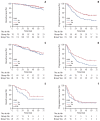Effect of Postoperative Radiotherapy after Primary Tumor Resection in De Novo Stage IV Breast Cancer: A Multicenter Retrospective Study (KROG 19-02)
- PMID: 34265890
- PMCID: PMC9016291
- DOI: 10.4143/crt.2021.632
Effect of Postoperative Radiotherapy after Primary Tumor Resection in De Novo Stage IV Breast Cancer: A Multicenter Retrospective Study (KROG 19-02)
Abstract
Purpose: This study aimed to investigate the impact of postoperative radiotherapy (PORT) in de novo metastatic breast cancer (dnMBC) patients undergoing planned primary tumor resection (PTR) and to identify the subgroup of patients who would most benefit from PORT.
Materials and methods: This study enrolled 426 patients with dnMBC administered PTR alone or with PORT. The primary and secondary outcomes were overall and progression-free survival (OS and PFS), respectively.
Results: The median follow-up time was 53.7 months (range, 3.1 to 194.4). The 5-year OS and PFS rates were 73.2% and 32.0%, respectively. For OS, clinical T3/4 category, triple-negative breast cancer (TNBC), postoperative chemotherapy alone were significantly poor prognostic factors, and administration of PORT failed to show its significance. Regarding PFS, PORT was a favorable prognostic factor (hazard ratio, 0.64; 95% confidence interval, 0.50 to 0.82; p < 0.001), in addition to T1/2 category, ≤ 5 metastases, and non-TNBC. According to the multivariate analyses of OS in the PORT group, we divided the patients into three groups (group 1, T1/2 and non-TNBC [n=193]; group 2, T3/4 and non-TNBC [n=171]; and group 3, TNBC [n=49]), and evaluated the effect of PORT. Although PORT had no significance for OS in all subgroups, it was a significant factor for good prognosis regarding PFS in groups 1 and 2, not in group 3.
Conclusion: PORT was associated with a significantly better PFS in patients with dnMBC who underwent PTR. Patients with clinical T1/2 category and non-TNBC benefited most from PORT, while those with TNBC showed little benefit.
Keywords: Breast surgery; Postoperative radiotherapy; Stage IV breast cancer; Survival.
Conflict of interest statement
Conflict of interest relevant to this article was not reported.
Figures
Similar articles
-
The role of postoperative radiotherapy after primary tumor resection in patients with de novo stage IV breast cancer.Asia Pac J Clin Oncol. 2021 Dec;17(6):495-505. doi: 10.1111/ajco.13506. Epub 2020 Nov 11. Asia Pac J Clin Oncol. 2021. PMID: 33179406
-
Evaluation of Adjuvant Treatments for T1 N0 M0 Triple-Negative Breast Cancer.JAMA Netw Open. 2020 Nov 2;3(11):e2021881. doi: 10.1001/jamanetworkopen.2020.21881. JAMA Netw Open. 2020. PMID: 33211105 Free PMC article.
-
Locoregional recurrence of triple-negative breast cancer: effect of type of surgery and adjuvant postoperative radiotherapy.Breast Cancer (Dove Med Press). 2014 Sep 10;6:151-8. doi: 10.2147/BCTT.S69309. eCollection 2014. Breast Cancer (Dove Med Press). 2014. PMID: 25228818 Free PMC article.
-
A meta-analysis on surgery with or without postoperative radiotherapy to treat squamous cell esophageal carcinoma.Int J Surg. 2020 Aug;80:184-191. doi: 10.1016/j.ijsu.2020.06.046. Epub 2020 Jul 10. Int J Surg. 2020. PMID: 32659390 Review.
-
Metaplastic Carcinoma of the Breast Is More Aggressive Than Triple-negative Breast Cancer: A Study From a Single Institution and Review of Literature.Clin Breast Cancer. 2017 Aug;17(5):382-391. doi: 10.1016/j.clbc.2017.04.009. Epub 2017 Apr 26. Clin Breast Cancer. 2017. PMID: 28529029 Free PMC article. Review.
Cited by
-
Survival Impact of Postoperative Primary Area Radiotherapy on De Novo Metastatic Breast Cancer: A Retrospective Study.Technol Cancer Res Treat. 2025 Jan-Dec;24:15330338251341195. doi: 10.1177/15330338251341195. Epub 2025 May 7. Technol Cancer Res Treat. 2025. PMID: 40336251 Free PMC article.
-
Letter to the editor for the article"Tumor margin irregularity degree is an important preoperative predictor of adverse pathology for clinical T1/2 renal cell carcinoma and the construction of predictive model".World J Urol. 2024 May 29;42(1):357. doi: 10.1007/s00345-024-05063-5. World J Urol. 2024. PMID: 38809470 No abstract available.
-
Machine learning predicts the prognosis of breast cancer patients with initial bone metastases.Front Public Health. 2022 Sep 26;10:1003976. doi: 10.3389/fpubh.2022.1003976. eCollection 2022. Front Public Health. 2022. PMID: 36225783 Free PMC article.
-
The prognostic differences and the effect of postmastectomy radiotherapy between post-chemotherapy ypT1-2ypN1 and de novo pT1-2N1 breast cancer.Cancer Med. 2023 Apr;12(7):8112-8121. doi: 10.1002/cam4.5610. Epub 2023 Feb 3. Cancer Med. 2023. PMID: 36734308 Free PMC article.
-
Impact of high dose radiotherapy for breast tumor in locoregionally uncontrolled stage IV breast cancer: a need for a risk-stratified approach.Radiat Oncol. 2023 Oct 11;18(1):168. doi: 10.1186/s13014-023-02357-7. Radiat Oncol. 2023. PMID: 37821947 Free PMC article. Review.
References
-
- DeSantis CE, Fedewa SA, Goding Sauer A, Kramer JL, Smith RA, Jemal A. Breast cancer statistics, 2015: convergence of incidence rates between black and white women. CA Cancer J Clin. 2016;66:31–42. - PubMed
-
- Chia SK, Speers CH, D’Yachkova Y, Kang A, Malfair-Taylor S, Barnett J, et al. The impact of new chemotherapeutic and hormone agents on survival in a population-based cohort of women with metastatic breast cancer. Cancer. 2007;110:973–9. - PubMed
-
- Sundquist M, Brudin L, Tejler G. Improved survival in metastatic breast cancer 1985–2016. Breast. 2017;31:46–50. - PubMed
-
- Badwe R, Hawaldar R, Nair N, Kaushik R, Parmar V, Siddique S, et al. Locoregional treatment versus no treatment of the primary tumour in metastatic breast cancer: an open-label randomised controlled trial. Lancet Oncol. 2015;16:1380–8. - PubMed
-
- Soran A, Ozmen V, Ozbas S, Karanlik H, Muslumanoglu M, Igci A, et al. Randomized trial comparing resection of primary tumor with no surgery in stage IV breast cancer at presentation: protocol MF07-01. Ann Surg Oncol. 2018;25:3141–9. - PubMed
Publication types
MeSH terms
Grants and funding
LinkOut - more resources
Full Text Sources


